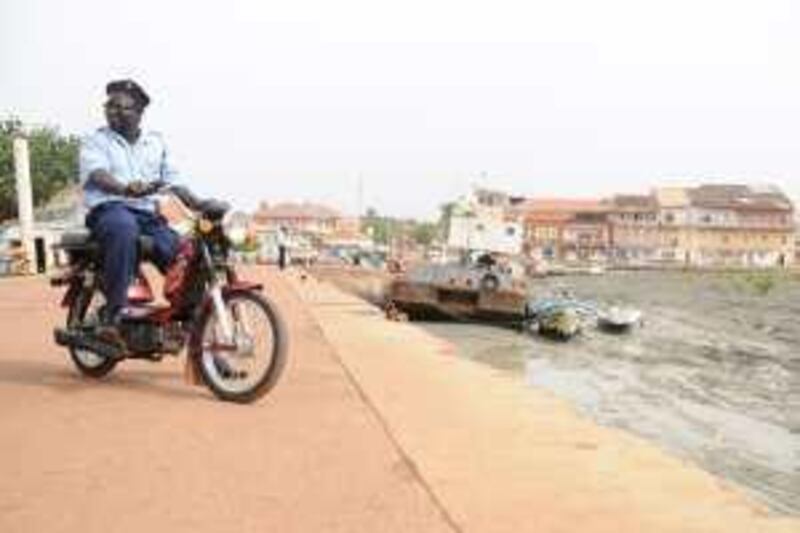BISSAU // Drug trafficking through Guinea Bissau and other countries in West Africa has fallen dramatically in the past few months, according to the UN Office on Drugs and Crime. In recent years, smuggling cartels have favoured fragile states such as Guinea Bissau for their porous borders, political weakness and proximity to both South America and Europe.
At the height of the problem in 2007, it was easier to buy cocaine than sweets on the streets of Bissau, the capital. Everybody, it seemed - from politicians to opportunistic fishermen - had cocaine on their hands, leading rights groups and media to pin the term "narco-state" to Guinea Bissau. But the UN said recent political developments and international awareness had scaled back the problem. "It is becoming increasingly difficult for drug traffickers to operate in Guinea Bissau," said Antonio Mazzitelli, the head of the UN body in West Africa. "Traffickers are looking for new routes, with some shifting towards parts of East Africa."
In 2007, 28 per cent of the cocaine seized in Europe was from South America via countries in Africa. A UN report states that by 2008, that figure had fallen to seven per cent. None of the cocaine shipments seized in Europe in the first part of 2009 was deemed to have passed through Africa. Drugs intended for Europe enter Guinea Bissau through airfields and the dilapidated port in the capital. The cocaine is then portioned into smaller packages, bound for Spain and Morocco by land and sea. In addition, drug mules - individuals paid to smuggle the drugs - many of whom are recruited from neighbouring countries like Guinea Conakry, leave Bissau on commercial flights bound for European destinations.
Political observers in the Portuguese-speaking country said the assassinations of the army chief Tagme Na Wai and the long-ruling President Joao Bernardo Vieira, in March this year, removed two of the key players in the cocaine trade. The government went from weak to non-existent, leaving a vacuum that holds less allure for the Latin American cartels. Vieira's closest regional ally, President Lansana Conté of Guinea Conakry, died last year.
Club X in Bissau is as much of a pit-stop on the cocaine trail as the city's port. With a disco ball, velvet-lined sofas and full mobile phone reception, the club is a gangster's paradise - the perfect locale for drug transactions. Deals are sealed in the quiet back room, out of earshot of the tunes that keep the drug mules dancing. But business has slowed. "As recently as a few months ago, we had lots of orders for champagne and whisky," said a barman who spoke on condition of anonymity. "Now, more people are drinking beer instead."
Stories are now the order of the day at Club X. Tales circulate like quisa, the Creole term for crack cocaine. There is the one about the villagers who found suitcases of cocaine, thrown from jets and dumped in the jungle. At first they used it to thicken body paint, then made dismal attempts to turn it into fertiliser, before finding a better use - filling football pitches. There's the one about the elderly cashew farmer who gave up his family's livelihood to peddle cocaine. Nobody knows what will become of him if the drug traffickers skip town altogether, but in one of the poorest countries in Africa, options are slim.
Down at the port, however, nobody talks. Mario Amadi Salé, who manages the maritime police stationed at the port, said he had not seen a shipment of cocaine in the 28 years he has worked there. His subordinates talk openly about everything except drugs, including their salaries of 30,000 West African francs (Dh235) a month. Joseph Mutaboba, who heads the UN mission in Guinea Bissau, said poverty and political insecurity had turned the country into a victim of drugs trafficking. He has commissioned a team of UN police officers to strengthen the country's under-resourced drugs squad.
Mr Mazzitelli of the UN said it was just one of a series of steps that bodies in West Africa were taking to steel the region against drug smuggling. Other countries have also begun to take baby steps towards cracking down on cartels. In Ghana, drug trafficking became one of the key campaign issues. A smooth transition of power during that election left Ghana's reputation as West Africa's golden child intact. Guinea Bissau, widely viewed as the region's problem child, will go to the polls in a second vote on July 26. The vacuum of power in the wake of Vieira's death has made it harder for drug traffickers to operate in Guinea Bissau, but analysts say progress will only be made once there is a strong, resistant government in place.
"For now, Guinea Bissau is an empty space where anybody can do whatever he wants," Mr Mazzitelli said. "How can you define it as a narco-state when the state is missing?" kthomas@thenational.ae





